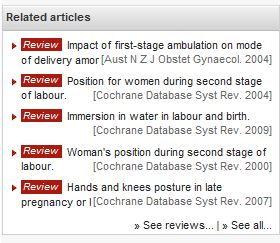November 28, 2009
Tracking Tools: Follow the Herd
By: Andrea D. Lythgoe, LCCE | 0 Comments
This article is part of the Understanding Research series.
So you found a few good articles, but you wish you could have found more. Sometimes all it takes is finding one good study, and you can use that one to find more!
There are several ways to do this:
1. Most studies will have a section discussing the literature previously published on the topic. Dig up some of those studies using the information listed at the end. And then check the bibliographies of THOSE studies, too. In the research world, this is called 'backwards chaining,' and works best with a more recent study. Sometimes you'll get lucky and in the database you'll see a list of the studies cited by the one you're looking at, like this list of references connected with a study I found on EBSCO:

2. Unless your study is brand spanking new, there's a good chance someone else has cited it in a newer study. So as you're searching, watch for places where you can see a list of studies that cite the one you're reading. Google scholar nearly always includes a 'Cited by' link under each search result. Meta-analyses and systemic reviews are GREAT finds if you can find one, as they tend to look at many studies all at once. This particular example of studies that cite the one I was interested in comes from EBSCO:

3. In the database where you found the study, look at the 'related articles' that share key words with your article. Google Scholar and PubMed generally have excellent links to related articles. They may be articles that share keywords, authors, etc. with the study you are looking at. PubMed flags any articles that are a critique or review of another article as well.

4. In most databases, the author's name is a link. Clicking on it will search for any other articles by that author. Since researchers sometimes tend to focus on particular topics, you can often find similar studies. Sometimes this works very well - as in the case of someone like Susan Ludington-Hoe, who has published quite a bit on the topic of kangaroo care. She also has a very distinctive name. If you find a study by someone with a more common name, like say MJ Anderson, there may very well be more than one of those. You could revise those results or combine an author search with a keyword search in this case.
I've said it before in this series and I'll say it again. The BEST way to get good at finding articles is practice, practice, practice! Try different indexes, try different approaches, and talk to a librarian for the tips and tricks!
Tags
Maternal Infant Care Andrea Lythgoe Understanding Research Tracking Down Studies